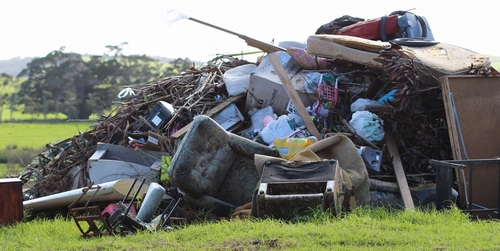Courtesy call, warning as spring burning season looms
25 Aug 2016, 9:00 AM
Northlanders are being asked to be courteous and follow the rules – or risk fines and other penalties – as they start thinking about burning unwanted vegetation and other waste material over spring.
Air Quality Specialist Obi Khanal says roughly a quarter of all calls to the Northland Regional Council’s 24/7 environmental hotline involve complaints about burning and/or associated smoke nuisance.
“However, burning typically increases during spring because as the weather improves, people are keen to start tidying up their properties ahead of the warmer summer months.”
Mr Khanal says historically, the council had preferred to educate in most cases, rather than take enforcement action, but its approach had toughened in recent years as backyard burning continued to generate large numbers of complaints.
He says from this year the harder line would apply to those caught breaching the rules at industrial and trade premises too.
 Banned...fortunately this intended bonfire – containing many materials it is illegal to burn – was discovered by the Northland Regional Council and dealt with before it could be lit last year.
Banned...fortunately this intended bonfire – containing many materials it is illegal to burn – was discovered by the Northland Regional Council and dealt with before it could be lit last year.
“Open burning at industrial or trade premises is not permitted under our Regional Air Quality Plan and from now on businesses breaching this rule will typically receive a $1000 instant fine, rather than the warning they may have got previously.”
Mr Khanal says backyard burning rules effectively applied to two broad geographical areas; one for the more densely populated Whangarei area and another for the rest of the region.
“People living within the Whangarei city airshed – which is roughly bordered by Maunu, Onerahi, Tikipunga, Springs Flat and Hurupaki – are not supposed to burn waste material unless they obtain resource consent or their property is more than one hectare.”
“Northlanders outside that Whangarei airshed can have outside fires, as long as they don’t cause offensive or objectionable smoke or odour to neighbouring residents or obscure vision along public roads.” (The ability to have fires obviously does not apply when restricted fire season or fire bans have been imposed by local authorities.)
Mr Khanal says the regional council was keen to encourage alternatives to backyard burning wherever possible.
“Waste vegetation can be composted or mulched, larger branches can be used as firewood and paper and other materials can usually be recycled.”
If waste vegetation was being burnt, a lot of problems could be easily avoided just by ensuring it had been given plenty of time to dry out, rather than burning it green.
However, he says even if burning is allowed, both the council’s Regional Air Quality Plan and national regulations specifically banned the burning of a number of materials on health and environmental grounds.
These included rubber tyres, coated metal wires, treated timber, plastic containers, motor vehicle parts and waste oil.
“Those breaching the rules are liable for enforcement action which can range from instant fines of up to $1000, abatement notices and prosecution – the latter with the risk of much stiffer penalties – through the courts.
Mr Khanal says general information on the rules around backyard burning – including a more detailed map of the Whangarei airshed – is also available from the council’s website: www.nrc.govt.nz/backyardburning
Those wanting to report nuisance or other burning can contact the regional council’s 24/7 environmental hotline (0800) 504 639.
